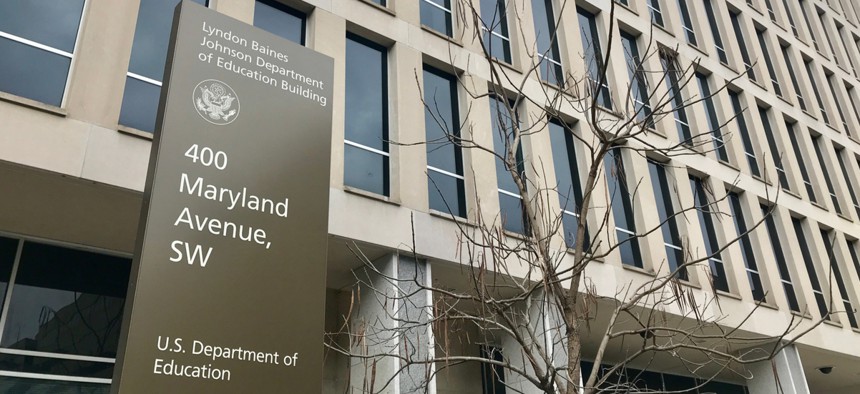
Jer123 / Shutterstock.com
The Education Department is Investigating Foreign Influence at Two Prominent Universities
The agency wants detailed records of what the institutions received from the Russian, Chinese, Saudi Arabian and Qatar governments, as well as Huawei, ZTE and others.
The Education Department is investigating two American universities—the Massachusetts Institute of Technology and the University of Maryland—regarding whether they’ve properly reported contracts with and gifts from several foreign governments and tech-related entities, according to letters sent to the institutions in late September and recently released to the general public.
Officials are specifically interested in records of anything they’ve received from the Russian, Chinese, Saudi Arabian and Qatar governments, as well as Huawei, ZTE and other foreign companies that have recently been exposed to more severe federal scrutiny.
In each correspondence, the agency’s Acting General Counsel Reed Rubinstein, who is leading the investigation, wrote that the government “is concerned that [the universities’] reporting may not fully capture all gifts, contracts, and/or restricted and conditional gifts or contracts from or with all foreign sources” to each institution and their affiliates.
The department allots both MIT and UMD 30 days to produce records across 14 related requests, including all those referencing gifts or contracts with foreign sources dating back to the beginning of 2014. The letters also ask each to share specific IRS and tax information between 2014 and 2018, and they also offer them the opportunity to list any gifts or contracts that were not previously properly reported, with detailed explanations regarding why they failed to do so.
On top of the overall institutions’ dealings, Education also asks for a list of all their inside people who have been supported by a gift or contract from international sources—“e.g., a research scientist working on a project developing artificial intelligence or engineering systems funded in whole or in part by a foreign source, a foreign graduate student studying physics under a scholarship or other contractual arrangement with a foreign government, a fellow in a cultural studies program created by endowment or other gift from a foreign source,” it notes.
The agency also asks each for relevant records related to gifts and contracts from specific entities including the governments of Russia and Qatar and the People’s Republic of China, Huawei Technologies, ZTE Corp, Kaspersky Labs, and other similar international organizations. MIT is also asked to provide records for its dealings with the government of Saudi Arabia and a few of the country’s companies and educational institutions.
“The time frame for this request is January 1, 2012, to the present,” the publication notes.
Though a variety of matters likely influenced the inquiry, an Education official told Nextgov Tuesday that the department expects all institutions receiving Title IV, or federal financial aid, funds to report all foreign gifts and contracts of $250,000 or more. "The law requires this transparency, our national security demands it, and the public deserves it," the official said.
But the investigation also comes as the government has already launched a variety of inquiries into and regulations against Huawei, ZTE and other international entities, over fears around possible cybersecurity risks and threats they could pose around foreign influence, due to their potential connections to the governments of the countries that they operate in. At the Center for Strategic and International Studies, Stephanie Segal, senior fellow of the Simon Chair in Political Economy, has been tracking various efforts by different American federal agencies to identify relevant risk vectors and, in particular, how China can use the nation’s research environment to get access to certain sensitive American materials.
Segal, who previously served as co-director of the Treasury Department’s East Asia Office, noted that this inquiry is just one aspect of a much larger evolving issue around U.S.-foreign relations and competition. She added that it’s crucial to note that the American economy, and research and innovation ecosystem has historically been predicated on openness and international collaboration.
“I think we feel that our openness is something that has served us well and has actually allowed us to be the leading global economy and the leading global innovator, but there’s concern that that openness is now being used against us—and ... in particular, that if different actors in that research space are not cognisant of the risks and managing those risks, it can be used to actually undermine the United States,” she said.
Officials from both MIT and UMD also confirmed to Nextgov that the institutions are cooperating with the investigation, as their foreign connections have also raised concerns in the past. A representative from MIT said the university identified ways to improve its foreign gift and contract reporting about a year ago and noted that its reporting since January 2019 has been based on the “improved processes.”
“MIT takes its federal reporting obligations seriously,” the official said. And at UMD, a representative said insiders “will continue to work with federal officials in a cooperative and transparent manner to resolve the matter.”
It’s still unclear what the investigation will uncover, but some argue that the government’s enhanced scrutiny must be balanced with the American values around openness and collaboration that have underpinned some of the nation’s greatest innovation.
“We benefit from foreign students and foreign researchers being here, and we benefit from these cross-border collaborations, so whatever we do we can’t close all that stuff off—or we are actually going to end up hurting ourselves,” Segal said.
NEXT STORY: Why Trump (Probably) Won’t Ditch Rudy







